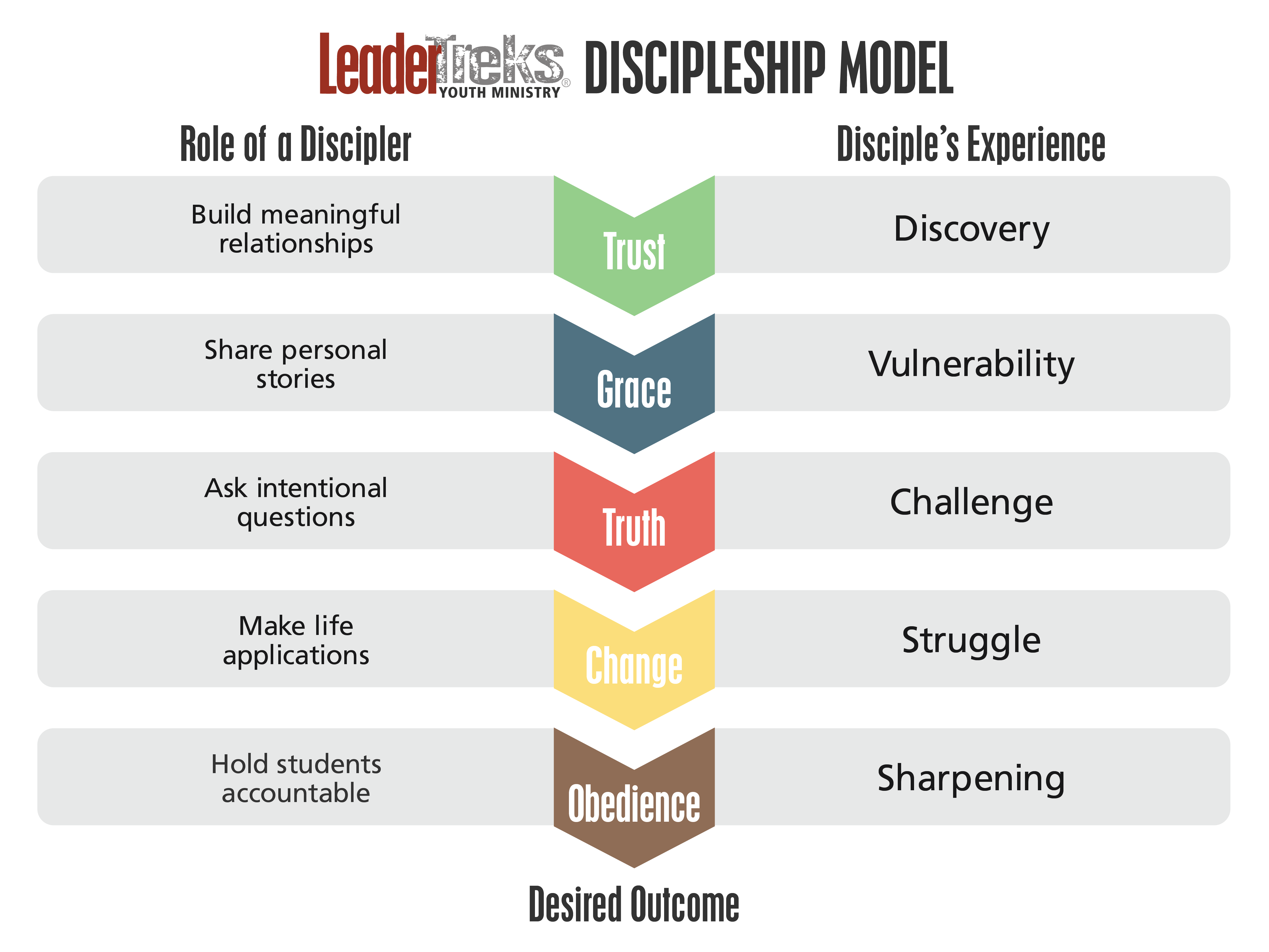LeaderTreks Discipleship Model
We’ve got a problem.
Everyone is talking about discipleship, but few people can tell you how to do it.
We’ve attempted to define discipleship, yet we struggle to get on the same page about what discipleship really means. To talk about what discipleship is, we may need to first explain what it isn’t.
7 Misconceptions about Discipleship (The Problem)
1. Small groups = discipleship
When I ask youth workers what discipleship strategy they’re using, nine out of ten tell me, “Small groups.” And I love that we’ve devoted much of our attention to small group ministry, but allow me to share a piece of hard truth: small groups are not a strategy. They may be a vehicle for discipleship, but small groups do not inherently yield the results of discipleship. A discipleship strategy is a plan in which a mature believer walks with an immature believer through biblical truth, challenging the immature believer to live a new way. Because we’ve equated small groups with discipleship, many of us have fallen short of actually growing and developing disciples.
2. Programs disciple students
In the same way, we can’t look to programming alone to disciple students. People—not programs—disciple students. It’s time to shift our thinking away from a one-size fits all mentality and create time and space for adult volunteers to enter into deep and meaningful relationships with students. Only then will we begin see discipleship take place.
3. Discipleship happens because kids come to church
You’ve heard this before, but it bears repeating: going to church doesn’t equate life change. We can’t assume that a student is being discipled just because they are regularly attending youth group. We’ve all seen how many of our students act at church. In many cases, they don’t seem to have any idea of why they are there. The truth is you can’t be a disciple without wanting to be a disciple, and we must take steps to inspire this desire in the hearts of our students.
4. Discipleship is happening at home
Home is another area where we must be careful of assumptions. It’s possible that students are being discipled at home, but it’s also likely that they are not. Some parents have not been discipled themselves, and, as a result, they don’t know how to disciple their children. Others may have no interest in the church or in their children’s spiritual development. These are facts that we cannot take for granted, and it’s part of our role as youth workers to help parents become their children’s primary faith influencers.
5. Discipleship happens because you hang out with students
Admittedly in my early days as a youth pastor, I wanted to create an atmosphere of fun and excitement in our youth ministry. I did this through games, worship bands, crazy stunts, and events that seemed risky even though they were not. But looking back, I’m not sure I achieved the goal I was shooting for. I was good at hanging out with students, but I saw very little return on my investment. Perhaps, like me, you’ve also been focused on creating a culture of fun and you’re ready to begin creating a culture of transformation where discipleship can flourish.
6. Students won’t come to church if you focus on discipleship
Sometimes we are under the impression that students won’t attend youth group if we go too deep. We take a look at students’ lifestyle choices and assume that they are uninterested in growing as disciples and followers of Christ. While it’s certainly not true of every student, I’ve found that many students are more engaged than we give them credit for. It’s important that we don’t rob students of a major growth opportunity just because we feel somewhat hesitant or wary about their reactions.
7. Your sermon disciples students
Let’s be honest, even after hearing our best-crafted sermon, most students will walk away and forget the majority of what we’ve talked about. We can’t look to as sermons as the sole source of discipleship in a student’s life. Speakers don’t changes lives, but change can occur when a mature believer chooses to invest in a younger believer by the power and guidance of the Holy Spirit.
Discipleship is one of the highest callings in youth ministry, and it’s important that we own up to not always knowing what it is that we’re talking about. The more we’ve bought into these misconceptions, the less likely we are to move forward in discipleship. Thankfully, there’s a different approach that we can take to discipleship.
LeaderTreks Discipleship Model (The Solution)
At LeaderTreks, we define discipleship as multiplication through relationships. Through relationships we make disciples who, in turn, build relationships and make more disciples. Any discipleship strategy, therefore, must explain the inner workings of a discipleship relationship; it must establish a plan for both the discipler and the disciple.
“Any discipleship strategy must explain the inner workings of a discipleship relationship.”
That’s why we wanted to create the LeaderTreks Discipleship Model. The LeaderTreks Discipleship Model articulates a strategy of discipleship by outlining the role of the discipler, the disciple’s experience, and a series of desired outcomes.
The model hinges on the role of a discipler, which describes a series of practical steps for disciple makers. Check it out:

Build Meaningful Relationships
Discipleship cannot take place outside the context of a deep and meaningful relationship. Students want to learn from people who care about them; they want to be discovered and known. The key to discovering a student is asking questions. Begin by asking about their friends at school or their favorite sports team, and then dive into questions that get at students’ hopes, fears, struggles, and dreams. A meaningful relationship is what lays the foundation for continued discipleship.
Share Personal Stories
Our personal stories are one of our greatest tools in the discipleship process. When shared with a student, our bad decisions and past mistakes point to God’s mercy and forgiveness and demonstrate God’s ability to work in and through broken individuals. Our vulnerability encourages students to be vulnerable and opens the door for students to more fully understand and experience God’s grace.
Ask Intentional Questions
Intentional questions get students to think beyond the “right answer” and dive deeper. Transformational discipleship requires that we ask questions like, “Why is that important to you?” or “What would that look like if lived out in your life?” In doing so, we challenge students to seek out out the truth and begin to own their beliefs.
Make Life Applications
As disciple makers, we must ask students to make practical and tangible life applications. Great applications answer the questions “Who? What? Where? When? How?” The application of “I want to love my younger brother more” becomes “I will make a snack for my younger brother when he gets home from school on Wednesday.” Specific and measurable applications give students ways to put their faith into action.
Hold Students Accountable
Accountability provides sharpening to the life and walk of a disciple. By taking the time to debrief students’ applications and ask them about it later on, we can see for ourselves if a lesson made an impact. If the student follows through, we know that transformation is taking place; if they don’t, we have another opportunity to find out why.
The LeaderTreks Discipleship Model is designed to be used as a training tool with your adult volunteers.
Download the LeaderTreks Discipleship Model and Video to train and equip your adult volunteers for transformation.

About the Author
Doug Franklin
Doug Franklin is the president of LeaderTreks, an innovative leadership development organization focusing on students and youth workers. Doug and his wife, Angie, live in West Chicago, Illinois. They don’t have any kids, but they have 2 dogs that think they are children. Diesel and Penelope are Weimaraners who never leave their side. Doug grew up in… Read More




